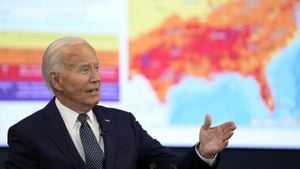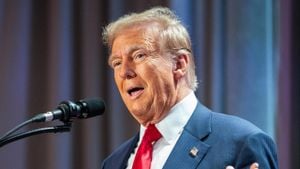North Korea, under the leadership of Kim Jong Un, has recently made headlines with its latest military initiative: the mass production of suicide drones, also known as loitering munitions. This move follows reports of successful tests of these drones earlier this year, indicating a significant shift in North Korea's military strategy.
According to North Korean state media, Kim Jong Un personally oversaw the test of these explosive drones and expressed the urgency to ramp up their production. The state-run Korean Central News Agency (KCNA) highlighted the need for North Korea to develop and deploy these drones on a large scale, reflecting the country’s recognition of their effectiveness on the battlefield.
The drones are not just buzzwords but represent advanced military technology capable of engaging with targets both on land and at sea. The KCNA report noted the drones had been tested across various routes, successfully destroying live targets including military vehicles.
One training exercise showcased imagery of drones obliterated both stationary and mobile targets. It was claimed these unmanned aerial vehicles can adapt to differing ranges, making them versatile tools of warfare. The ambitious goal is to establish serial production systems for these drones as swiftly as possible, ensuring they can be integrated comprehensively within North Korea's military framework.
Kim underscored the global competition around drone warfare, pointing out how militaries worldwide have recognized the impact of such technologies. He noted, “The military authorities will probably recognize these drones are achieving clear successes in big and small conflicts,” affirming the increasing relevance of drone utilization.
Suicide drones have gained traction globally, featuring prominently in conflicts like the wars in Ukraine and various battles within the Middle East, allowing armed forces to carry out missions with fewer manned aircraft and at reduced costs compared to traditional missiles.
Such advancements come as North Korea is seen enhancing its military alliance with Russia. Concerns have arisen among Western nations about the extent of technical support Kim might be receiving from Moscow, especially with reports indicating the deployment of North Korean troops to aid Russian forces on the frontlines of the Ukraine conflict.
Meanwhile, the announcement of these new developments was laid against the backdrop of recent military exercises conducted by the U.S., South Korea, and Japan, which included the deployment of advanced fighter jets and naval assets. This reflects the heightened tensions and military preparations associated with North Korea's increasing aggressive stance.
This recent initiative is part and parcel of North Korea’s broader strategy to modernize its military capabilities as the state feels compelled to adapt to the changing dynamics of military technology. Notably, Kim Jong Un had previously hinted at the need to upgrade military practices and theories to align with contemporary developments.
The move for mass production could possibly alter the balance of power within the region, especially as South Korea and Japan are also boosting their defenses against potential North Korean threats.
North Korea's prior attempts to deploy drones have not been without hiccups. For example, earlier incidents saw the South Korean military shoot down North Korean drones crossing border areas. This has fueled debates within South Korea about the effectiveness of its own defense systems and the protocols surrounding responding to incursions.
Analysts warn this technological leap could embolden North Korea to increase its provocations. The successful integration of drones could change the operational dynamics of military confrontations not just within the Korean Peninsula but potentially across broader Asia.
For decades, North Korea has asserted itself as a player on the global military stage, often employing provocative tactics such as missile tests and military parades showcasing its arsenal. The push for drone production, then, could be perceived not just as another exercise of military bravado but as part of Kim Jong Un's strategy to solidify his domestic support and integrate advanced warfare technologies.
North Korea is poised to emerge as one of the only nations adopting and manufacturing their drone technology to such unprecedented levels. With the world watching closely, the repercussions of this endeavor remain to be seen, particularly its impacts on diplomatic relations and regional security dynamics.



